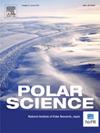谁来解决污染问题?行动者之间的关系和阿拉斯加偏远社区废物管理工作的赠款
IF 1.5
4区 地球科学
Q3 ECOLOGY
引用次数: 0
摘要
本研究讨论了阿拉斯加偏远村庄的垃圾相关问题,重点关注政府官员和非营利组织等支持提供者与土著人民之间的关系,从自决的角度出发。随着最近生活方式的改变所产生的废物数量和种类不断增加,健康和环境问题日益受到关注。每个村庄负责废物管理,并经营一个废物处理场。然而,目前的废物管理制度存在挑战,突出了赠款资助的倡议和非营利组织支持的重要性。基于对支持者的访谈和对支持者与原住民之间谈判过程的观察,本研究分析了阿拉斯加的拨款和合作努力。通过赠款和合作倡议,土著人民融入主流社会是不可避免的,尽管尊重土著自决和交流的努力正在进行中,并作为缩小废物制度与现状之间差距的框架。然而,仍有两个未解决的问题:“等待援助”的困境,以及各定居点之间的社会、经济和地理多样性所引起的问题。尊重环境治理方面的自决与提供超越机会平等的支持之间的平衡将是未来关系的关键。本文章由计算机程序翻译,如有差异,请以英文原文为准。
Who addresses pollution? Relationships among actors and grant money for waste management efforts in remote Alaskan communities
This study discusses waste-related issues in remote Alaskan villages, focusing on the relationships between the support providers, such as government officials and nonprofits, and the indigenous people, from the perspective of self-determination. With the increasing volume and variety of waste generated by recent lifestyle changes, health and environmental issues have become growing concerns. Each village is responsible for waste management and operating a disposal site. However, challenges exist regarding the current waste management regime, highlighting the importance of grant-funded initiatives and support from non-profit organizations. Based on interviews with supporters and observations of the negotiation process between supporters and indigenous people, this study analyzes the grants and collaborative efforts in Alaska. Through grants and collaborative initiatives, the assimilation of indigenous people into mainstream society is inevitable, although efforts to respect indigenous self-determination and communication are ongoing and serve as a framework for bridging the gap between the waste regime and status quo. However, two unsolved issues remain: the “support-in-waiting” dilemma, and the issues arising from the social, economic, and geographical diversity among settlements. The balance between respect for self-determination in environmental governance and provision of support extending beyond equality of opportunity will be the key to future relationships.
求助全文
通过发布文献求助,成功后即可免费获取论文全文。
去求助
来源期刊

Polar Science
ECOLOGY-GEOSCIENCES, MULTIDISCIPLINARY
CiteScore
3.90
自引率
5.60%
发文量
46
期刊介绍:
Polar Science is an international, peer-reviewed quarterly journal. It is dedicated to publishing original research articles for sciences relating to the polar regions of the Earth and other planets. Polar Science aims to cover 15 disciplines which are listed below; they cover most aspects of physical sciences, geosciences and life sciences, together with engineering and social sciences. Articles should attract the interest of broad polar science communities, and not be limited to the interests of those who work under specific research subjects. Polar Science also has an Open Archive whereby published articles are made freely available from ScienceDirect after an embargo period of 24 months from the date of publication.
- Space and upper atmosphere physics
- Atmospheric science/climatology
- Glaciology
- Oceanography/sea ice studies
- Geology/petrology
- Solid earth geophysics/seismology
- Marine Earth science
- Geomorphology/Cenozoic-Quaternary geology
- Meteoritics
- Terrestrial biology
- Marine biology
- Animal ecology
- Environment
- Polar Engineering
- Humanities and social sciences.
 求助内容:
求助内容: 应助结果提醒方式:
应助结果提醒方式:


